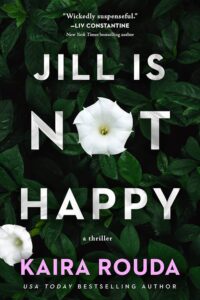In my first domestic suspense novel, Best Day Ever, a charming, confident husband named Paul Strom whisks his wife, Mia, away for a romantic weekend at their lake house. He tells us, from the first page, that everything is perfect. Their marriage. Their life. This day.
It’s not.
Paul is one of those men who thrives on appearances—smooth on the outside, rotten at the core. He narrates with chilling ease, convinced of his own brilliance, even as his carefully constructed life begins to unravel. And Mia? She’s not the compliant wife he thought he married. She’s starting to see through the cracks.
When I wrote Best Day Ever, I wanted to explore what happens when the illusion of the perfect marriage begins to crumble. What happens when control is confused with love, when surface-level perfection masks something more sinister beneath. It was a way to peel back the layers of suburban domesticity—to show how tightly we cling to appearances, even when they’re killing us.
That theme—the danger lurking beneath a well-manicured facade—has stayed with me through every book since. Because the truth is, the perfect marriage is the perfect illusion. And even knowing that, we still want to believe in it.
Maybe that’s part of the human condition. We crave the comfort of a tidy narrative: two people fall in love, build a life together, weather storms, grow old hand-in-hand. But behind every smiling couple’s Instagram post, every annual holiday card, there’s a story we’re not seeing. And sometimes, that story is darker than we can imagine.
In my upcoming novel, Jill Is Not Happy (out June 10, 2025), I dive deeper into the illusion of domestic perfection—this time through the eyes of a woman who refuses to accept that her dream is falling apart. Jill is a Ripley in yoga pants: a subtly terrifying, unreliable narrator who will do anything to keep Jack, her college sweetheart and the man she’s built her entire life around. She believes she’s the perfect traditional wife, with the perfect home, the perfect love.
But the truth beneath that is far darker. And while the secrets between them kept them together, they no longer hold the sway they once did. As Jack begins to pull away, Jill’s grip on her life begins to slip. She is not happy about that. Not at all. What follows is a suspenseful unraveling of appearances, revealing the dangerous lengths someone will go to in order to preserve the fantasy they’ve worked so hard to build.
Domestic suspense thrives in this space—the gap between perception and reality. And I think readers are drawn to it not just for the chills and twists, but because it lets us safely explore our own doubts. Our own comparisons.
We watch a fictional marriage fall apart and feel better, somehow, about the cracks in our own foundation. “At least we’re not them,” we say. “At least our secrets aren’t that bad.”
There’s a kind of voyeuristic relief in reading about toxic marriages. It’s both cathartic and comforting. But it also forces us to confront something deeply uncomfortable: how much of our relationships are built on performance? What would we find if we scratched just a little beneath the surface?
Some of the greatest thrillers of our time have posed those same questions. Gillian Flynn’s Gone Girl set the standard for marital mind games, giving us Amy Dunne—a wife who weaponized the ideal of perfection to mask sociopathic control. Then there’s The Silent Patient by Alex Michaelides, where a woman’s silence in the wake of her husband’s murder conceals a deeper, more twisted truth. The Couple Next Door by Shari Lapena shines a light on how easily trust can dissolve under pressure, and The Wife Between Us by Greer Hendricks and Sarah Pekkanen explores the ways women are conditioned to fight for a man who may not be worth the battle.
Each of these stories plays with the illusion of marital bliss—upending our assumptions, twisting our expectations, and ultimately revealing how fragile love can be when tangled with power, deceit, or obsession. Toxic domestic suspense is my kind of thriller.
Maybe that’s why the genre is so enduring. Domestic suspense taps into something primal—our need for connection, our fear of betrayal, our complicated relationship with trust. It reminds us that love can be blind, that passion can turn poisonous, and that no one really knows what happens behind closed doors.
In my novels, I’ve tried to walk that line between glamour and danger, between surface perfection and internal chaos. Whether it’s a sociopathic husband, a fed-up wife who will keep her husband no matter what, or a secret festering at the center of a family, I’m fascinated by the masks we wear—and what happens when they finally slip.
Because while the perfect marriage may be an illusion, the desire for it is very real. We want to believe someone has figured it out. We want to believe we can, too. But deep down, we know better.
And so, we write. We read. We turn the pages, hoping for justice or redemption or just one good twist we didn’t see coming.
Because if there’s one thing crime fiction teaches us, it’s this: love may be blind—but suspense sees everything.
***


















